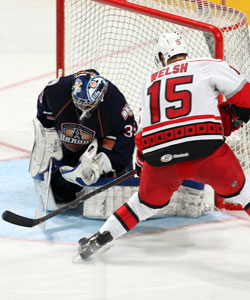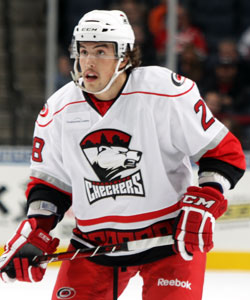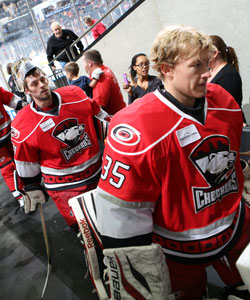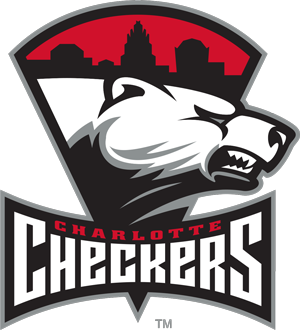Given everything that happened, it’s almost hard to believe that it the entire thing took place in the confines of a single season. It can almost be divided into three, starting with the unprecedented level of depth and skill they had at the start, their difficulty finding enough healthy bodies in the second half and then finally getting to something resembling normalcy just in time for the playoffs.
In the grand scheme of things, there seemed to be a sense of pride in what they accomplished as a team and as individuals. Still, there was no getting around the disappointment of how it ended – a first-round loss to Oklahoma City in which the Checkers lost two consecutive home games when they had a chance to move on to the next round.

“For me, this was a good group of guys that really liked coming to rink together and were excited about the playoffs,” said coach Jeff Daniels. “There was a lot of disappointment because we really felt we could make a run.”
There were a handful of potential turning points in the postseason, starting with Game 2 in which the Checkers took a 2-0 lead in the first period, giving them a chance to sweep both road games of the best-of-five series. They then allowed the Barons to score five unanswered goals, which Brett Sutter referred to as “the backbreaker.”
Still, things seemed to be going just fine when the Checkers romped to a 6-1 victory in Game 3, putting the Barons and goalie Yann Danis on the brink of elimination. However, their goal total in that single game would double what they were able to muster in the final two games, including their 51-shot total in Game 5.
“I made a joke that we wasted all the goals that night, and we probably did in some sense,” said Chris Terry.
It was mostly downhill from there, with the Barons out-scoring the Checkers 14-3 in the final two games. Charlotte’s fate was sealed when the Barons broke open a tie game with three goals in the second period of Game 5.
“At 2-2 going into the second, I felt great and thought there was no way we were going to lose,” said Terry. “The third goal happened then the fourth goal happened and we just couldn’t stop the bleeding.”
Regardless of where they felt things turned, any momentum swings, and there were many, became magnified in a short series.
“A five-game series is a bit of a scam after you work that hard all year,” said Riley Nash.
While they hoped for a longer run, the season certainly produced its share of memories. At the start, the Checkers, bolstered by talent they would later lose to the NHL, were one of the league’s dominant teams thanks to a high-powered offense, a good mixture of depth on defense and two standout goaltenders.

When the lockout ended, the Checkers had plans and were prepared to make adjustments. No amount of planning could help cope with the subsequent injury crisis in March that saw the team made up of almost entirely of fresh faces from the ECHL.
Already without a pair of former All-Stars in Marc-Andre Gragnani and Jerome Samson for most of the second half, things really came to a head when the team lost three players – Michal Jordan, Luke Pither and Justin Shugg – in the first period of a game against Houston on March 10. Three days later, rookie Danny Biega, brought in fresh from college and thrown directly into the lineup to fill the gap, suffered a concussion in one of his first shifts as a professional. Brendon Nash, who was supposed to be a steadying veteran presence on the blue line to help replace Jordan and Gragnani, lasted one game after arriving in a loan deal in April.
In short, Daniels had to find replacements for replacements who were supposed to have replaced replacements. All things considered, his team did quite well to make the playoffs as the No. 4 seed and put itself in a position to fulfill its early-season promise.
“We were scrambling for guys, and it was a credit to the leadership of this team that kept us afloat,” said Daniels, who used a total of 48 players this season. “They deserve a lot of the credit, and so do the guys coming in from Florida and throughout the (ECHL) that came in and kept us going and got us into the playoffs. Without those guys, I don’t know what would have happened.”
“I’ve come to learn in this league that anything can happen on any given night, and I’ve seen some pretty crazy stuff in retrospect to who was playing in our lineup and guys flying in and out,” said Terry. “We stuck with it with the core guys like Brett (Sutter) and I and (Brett) Bellemore on ‘D,’ who seemed to be the guys that were always around. I thought we did a good job of holding the glue together.”
In the long run, it may have been an injury that happened to another team that hurt the Checkers the most. Much of what was said in the Carolina Hurricanes’ exit meetings involved how the team’s fortunes may have been different if not for the loss of Cam Ward to a season-ending knee strain on March 3.
At the AHL level, All-Star Justin Peters, one of 20 players to dress for both the Checkers and Hurricanes this season, had much of the same effect.

“You lose a caliber of Petey and it’s tough sometimes, but those guys played well.”
Madore, the team’s rookie playoff starter who did not play his first AHL game until March 21, did all he could under the circumstances, turning in some of the season’s best performances before having to make early exits from his final two games. The same could be said of John Muse, who broke his glove hand in practice the day before the playoffs began but still played in Game 5 nine days later. Mike Murphy, brought in as an experienced third option late in the season, simply did not have enough time to get back into game shape following a long hiatus.
As it turned out, all three of those goaltenders saw action over five playoff games – a sure indicator that things had not gone well. Peters, who finished in the AHL’s top 10 in goals-against average, save percentage and shutouts, would have removed much of the guesswork from the process.
Despite the constant adjustment, Daniels said that this was not his most difficult season as a coach. That sounds hard to believe at first, until one remembers that his Albany River Rats team endured a frightening bus crash during an already-hectic rookie season in 2008-09.
Compared to that literal life-and-death situation, the Checkers could cope with any difficulties from this season. However, that didn’t make it any less unusual.
“It was a little bit crazy year,” said Jordan, one of five players who earned their first-ever NHL recall this season. “There were so many changes during the year but I think we battled the whole regular season.”
“We had a good year as a team with all the call-ups and the injuries and we battled through,” said Nicolas Blanchard. “I think we can be proud of it.”






